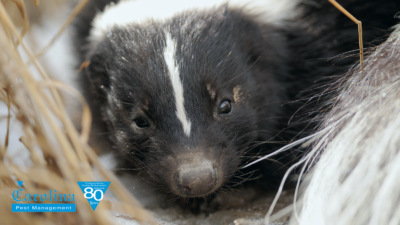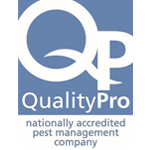When you think of skunks, a skunk’s revolting stench is likely the first thing to come to mind. Skunks can spray at distances beyond 20 feet with the scent affecting people and animals. Direct contact with skunk spray can be painful and cause temporary blindness. Skunks are also carriers for serious diseases such as rabies, roundworm, and canine hepatitis. Not taking care of a skunk infestation can lead to property damage since these critters are notorious for digging up lawns and gardens. Carolina Pest Management offers professional wildlife control options in Charlotte for homes and businesses faced with a skunk problem.
Take $15 Off
Enjoy a discount off your initial general pest service when you sign up for a quarterly service plan.
How to Identify a Skunk Problem

Since skunks are relatively easy to identify, spotting a skunk on your property is typically enough to alert you to an issue. Skunks are about the same size as a small household pet. They usually weigh less than 10 pounds and range from about 20 to 30 inches long. A skunk’s black and white fur and long claws make them hard to miss in the wild. Skunks make their dens in hollow logs, piles of brush, and beneath decks and porches. You’re also likely to find skunks scavenging for food around trash cans. If skunks do make their way inside of buildings, they usually hide in subfloor spaces like basements.
- Smell: Smelling skunk spray is a surefire way of identifying a skunk problem in Charlotte. The smell may be detected outdoors or you may smell the odor lingering on your pets. The sulfuric odor has over a mile range and can permeate the walls of your home.
- Holes in your yard: Skunks feast on bugs and will tear apart a lawn looking for insect and bee larvae. They will leave behind gaping holes and damage beehives. There may also be signs of digging around the foundation of your home as skunks look for a shelter.
- Important to know: Skunks are nocturnal, making them difficult to locate during the daytime hours.
Our Charlotte Skunk Inspection Process
After consulting with the homeowner, our technicians will thoroughly inspect your property for the common signs of a skunk infestation. We check under decks and porches to see if the animals have made a home in these areas. Our team will inspect for signs of foraging around your yard and garden. We’ll also look for potential entry points for skunks to make their way in and out of your home. As part of the process, we’ll identify the type of skunk infesting your property and what types of attractants are found nearby. We urge you to allow our technicians to handle all inspection procedures. Skunks can be dangerous and should not be dealt with on your own for safety reasons.
Charlotte Green Skunk Treatment

Carolina Pest Management works out a plan with the homeowner about how to best remove the skunks from the property. We believe in dealing with pests in a humane way. We prefer to use effective green pest control treatments when possible, so we won’t recommend using harmful poisons to rid your property of skunks. Poisons may not only harm these pests, but also inadvertently put your pets and other wildlife in danger. Instead, our pest control experts in Charlotte will create a natural skunk removal plan that involves exclusion and trapping.
Exclusion is meant to eliminate sources of food and shelter from skunks. Filling in holes where they can potentially make their dens is a good start. Holes may need to be covered with gravel or wire mesh. Any fallen berries and seeds should be removed from the ground, and garbage should be kept outdoors in cans with secure lids. Logs and woodpiles should be removed from the property. We will also exclude entry to all structures after we ensure all live animals are removed from the spaces.
Trapping and removal is a necessary part of skunk pest control. Using live traps ensure skunks are removed humanely from your property. Live traps are a preferred method of skilled technicians. We have the training to avoid getting sprayed by a skunk while removing them from your property.
Skunk Control Maintenance
To keep skunks away from your home, our Charlotte pest control technicians can utilize a variety of methods. One popular option is to put fencing around entry point areas. Wire mesh fencing with small openings prevents skunks from raiding your garden or making a home under your deck.
As another part of maintenance, you should avoid leaving food outdoors. Keep garbage secured and never keep pet food outside.
There are certain repellents on the market to stop skunks from returning to your property. Sprays and granule solutions are applied around entry points to ward off skunks. Electronic repellents are an option to deter the animal(s) away from your gardens. When triggered, a burst of water is used to scare off any wildlife creatures who may have the urge to enter your vegetable garden.
Charlotte Skunk Removal Frequently Asked Questions
How much does skunk removal in Charlotte cost?
Residents in Charlotte can expect the price of skunk removal to cost between $225 and $700. The biggest consideration of calculating the cost of skunk removal is the location of the animal. If the skunk is in a hard-to-reach area in the home or yard, the price will increase. For instance, a skunk hiding under a house can be challenging and more time consuming for the pest control specialist to reach. Skunk removal is never a job for the homeowner. Skunks will spray when cornered, and the stench is difficult to remove. After you capture a skunk, you’ll then be faced with the challenge of removing it from your property. Professionals will also need to inspect your property to determine the location of potential nesting spots. Skunks are more than nuisance pests: They not only leave behind a pungent odor, but they can also transmit diseases like rabies. Skunk removal is a specialized job and should only be done by a licensed professional.
What should you do if you’re sprayed by a skunk?
A bath in tomato juice to remove skunk odor is an old wives’ tale. The best method is to create a wash made up of equal parts dish soap, baking soda, and hydrogen peroxide. Use the mixture on all areas exposed to the spray with the exception of the eyes. Flush eyes with water immediately if sprayed.
Are all skunk control methods effective?
Like all other pests, skunks may require multiple strategies to effectively remove them. For instance, certain deterrents may not work on skunks in the spring after breeding season begins for the animal. Carolina Pest Management employs more than one eco-friendly pest control strategy to increase chances of success.
Should you trap live skunks on your own?
No. Skunks will spray at the smallest indication of being threatened. Skunks will give a few signs that they are about to let loose their spray. The most obvious sign is the tail will go straight up into the air. Skunks can accurately hit their targets from a distance and can spray multiple times.
Will outdoor lighting help deter skunks?
Since skunks are nocturnal, lights can be somewhat of a deterrent. However, most homeowners cannot achieve long-term skunk control in Charlotte with added outdoor lighting alone.
How to Keep Skunks out of Your Yard
Getting rid of skunks from your yard doesn’t have to be a stink. Although some skunks can be domesticated, most are wild creatures that can wreak havoc on your home and garden. The good news is you don’t have to share your home with a foul-smelling skunk. A few modifications can control your skunk problem […]
Read More »Skunk Control Charlotte Technicians
Skunks can damage your property and put your family and household pets at risk of being sprayed if not removed immediately. Carolina Pest Management technicians have extensive training on skunks, their habits, and the best methods to remove them without damaging your property. Unlike the skunk exterminators in the past, our technicians rely exclusively on humane methods such as trapping and exclusion. The removal technician assigned to your property will use these strategies to quickly control your skunk problem through removal and help prevent future skunk infestations.



